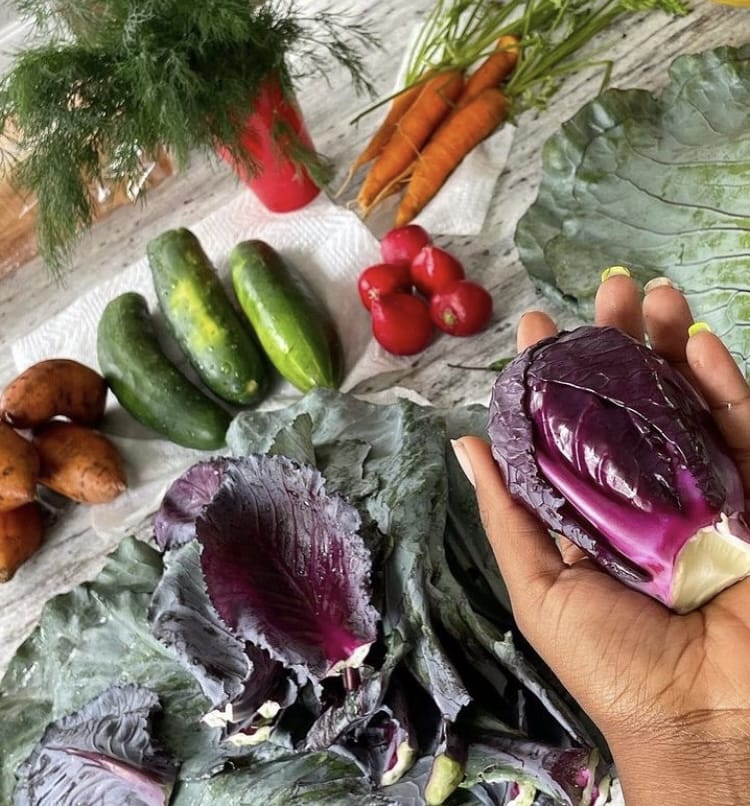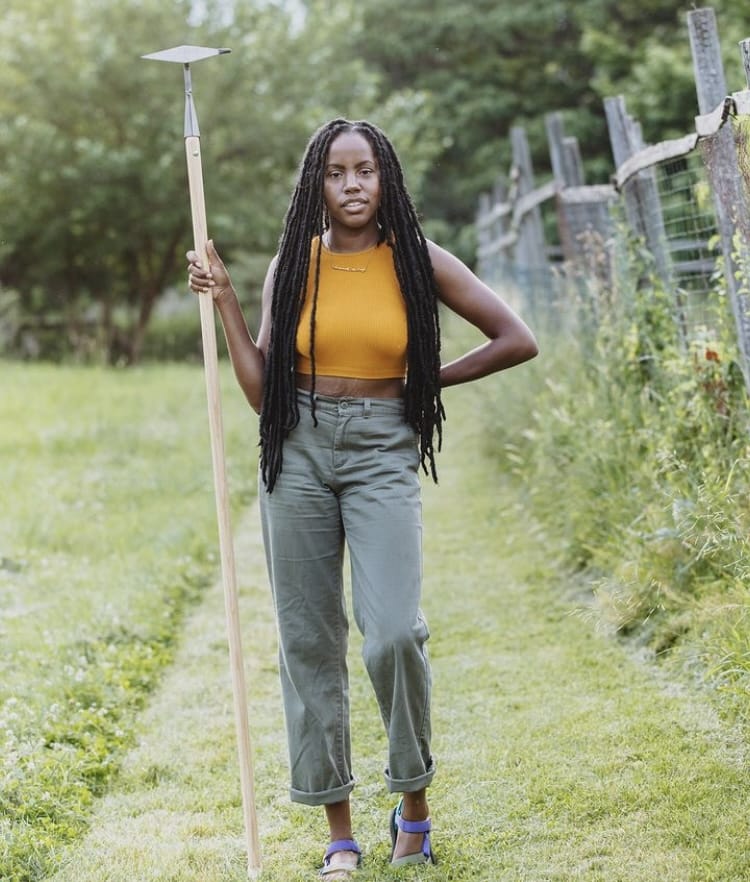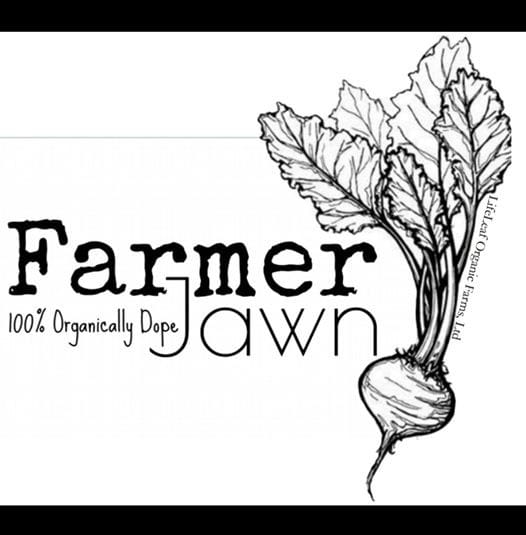
Hooray for Monday is a weekly blog filled with questions, ideas, reflections, and actions we can all take to remodel the school experience for students.
Prefer audio? Listen to the Hooray For Monday podcast! Available on your favorite platforms here.
July 31, 2023
Over the past several weeks, Inspired Teaching has spoken with individuals who inspire us, asking them about the role of curiosity in their lives. Last week, Aleta spoke with a master yoga instructor, Marcus Lee. You can listen to their conversation on the Hooray For Monday podcast here or read the transcript here.
This week, marketing and communication specialist Michelle Welk spoke with Christa Barfield.


Christa Barfield is the founder and CEO of FarmerJawn Agriculture, an organization that stewards more than 100 acres of organic, regenerative farming land in the Philadelphia area, in addition to operating a CSA and a corner store opening this fall. Michelle spoke with Christa about her journey from healthcare to farming and the importance of a teacher’s support in pursuing curiosity.
Read the transcript of their conversation (lightly edited for clarity) below!
Christa: My name is Christa Barfield. I’m the founder and CEO of FarmerJawn Agriculture and I focus really on reintroducing farming into the lifestyles of people. We often have no idea where our food comes from. Most of us are not living in an agrarian lifestyle anymore as we, you know, our lineage did long ago. So we are getting back to soil, getting back to the basics of which all things come from. Really, what I love to make sure people understand is that everything that they touch that is a need and necessity to them started as a plant somewhere and there was a farmer behind that plant or someone that cultivated that.
From the houses that you live in: the trees, the lumber, you know that there were people here, historically native people, like the Lenni Lenape of Pennsylvania, that were responsible for planting trees. So you can have these homes that you live in now made of this beautiful lumber. All the food that you’re eating started somewhere on somebody’s farm, as well as the clothes that we’re wearing; their fibers were once plants. So I really like to make sure that we all understand that. That’s a big part of my work.
Michelle: That’s wonderful. And I know you focus on regenerative and organic farming out in the suburbs of Philadelphia currently.
Christa: Yeah, actually throughout the whole region. I am a Philadelphian and my work is focusing on Philadelphia people and the metro at large. So we steward 128 acres total throughout the region and 123 of those acres are in the suburbs of Philly, about 45 minutes away.
But the entire operation is all regenerative organic and it’s about the reclamation of land for Black and brown people. That’s one aspect and the other side of that is ensuring that we’re getting back to the ways of indigenous practices that don’t utilize harmful chemicals such as Round Up and ensuring that glyphosate is not a part of the diet of Americans and especially in Philadelphia.
Regenerative agriculture really focuses on planet and people. There are these main pillars of regenerative farming and one of them is people-focused, like focusing on “who is that person, the people, that are responsible for growing that food? Are they being taken care of? Are they being paid well? Are their working conditions good?”
And I love that. That’s a part of that certification. You have to make sure we’re taking care of the people who are doing the actual farm work, which has not been at all focused on for centuries.
Another aspect is the soil. How is that soil in the land that we’re working? Is it healthy? Is that soil rich in color and rich in nutrients and rich in microbes? What does the science of the soil say? What does it look like on paper? And are there earthworms in it? Like, can you see earthworms flourishing in the soil? Do they come up and like peek their heads up? Those are the kind of things that are an indicator if your soil is healthy or if it isn’t.
And if it’s not, there are some things that you need to do when we’re planting. One of the main aspects is making sure that we’re not removing the roots. Once we’re done, say if we plant some kale, after that kale plant is done, we leave the roots in the soil so that it can continue to build up the soil. Plant matter breaks down organically and naturally as it decomposes; it’s also building nutrition in that soil.
But traditional agriculture, which is Big Ag, farm factories, what they do is they pretty much strip the soil of all the nutrients. Once they grow it, they pull everything out of it. You’re losing topsoil as you do that.
And so, right now, the reason why the regenerative organic movement is so important is because there are studies that show that topsoil will be gone within 60 years, if we continue to grow food the way that we have or continue to work the land the way that we have.
And another piece that’s big for regenerative ag is also animal husbandry. Are you incorporating animals into the way that you’re growing food or the way that you’re growing anything – for us, it’s food. Because biodiversity is a very big keyword when we’re talking about regenerative agriculture: how land and people and planet, all the aspects that are naturally in motion.
Are you making sure that you’re stewarding in a way that all those things can work together in harmony? Those are the main aspects of regenerative agriculture. Making sure you’re taking care of people, making sure that animals are being incorporated into your style of growing and farming, and land stewardship. Making sure that your soil is healthy, first and foremost.
And so if all of those things are good, then you have improved immediately air quality, you’ve improved immediately soil quality. And then ultimately, the quality of life of people and the living beings roaming the planet naturally.
Michelle: It makes sense. Everything’s connected. So the better you treat people, the better they treat plants, et cetera. The earthworm thing is fascinating. I don’t know that I’ve ever considered it! Again, it makes sense when you think about it. But that’s wonderful. I’m going to have to start looking for worms to find out if things are things are going well.
So to back up a little bit, then, what drove your curiosity and interest in to farming in general? I imagine that once you actually start getting involved in it, you realize exactly how complex it can be. So, what was the process of discovery like for you?
Christa: Yeah. So I never touched soil before 2018. I never grew anything, touched plants. I never had a house plant, none of those things. So, my journey to agriculture is quite interesting because I worked in healthcare for 10 years.
But I’ve always had an interest in science. Like I love science. I love understanding the way things work and specifically life science. So my background is healthcare. And at one point, I wanted to be a clinician. And I was like, ok, that’s how I’m going to impact the world of healthcare, by being a direct clinician working directly with patients. And it ended up changing to me being the administrator of healthcare. And so I managed practices.
I made sure that things were paid for and my doctors were reimbursed, which is also a very key part of providing care because the business of it is important. So I ultimately made a really good career. I had a really great career. Unfortunately, great is relative because I ended up becoming burnt out.
I was extremely good at my job. So much so that I invested so much of myself into it and never invested self into self. I wasn’t focusing on my own wellness. And so I ended up becoming burnt out, which is not a unique story in any way. This happens all the time. But what I did next, and what was unique and what sets me apart, is I decided that once I resigned from my job – which I did and just kind of blink of an eye honestly wasn’t planned, it kind of was impulsive – I’d made the decision to travel for the very first time. I went to Martinique, a beautiful country in the French Caribbean.
It’s a francophone country. So it was great because I grew up learning French my entire life. I used it in elementary school, middle school, high school, and then college. And then didn’t use it ever after. So I was like, I think this will be a really wonderful way to reconnect and meet people and it’s an island. So I traveled to Martinique. It just so happened that in Martinique, the Airbnb hosts were Black farmers and that was not a part of their profile. It wasn’t! I literally chose that location because they had a swimming pool. That was my criteria.
And upon being there, they were just warm and friendly and I found out just in conversation about what they did. They were like, oh yeah, we grow food for a living, we have a produce farm and they didn’t say the word “CSA” but when I got a chance to see them in action, which was something they invited me to do, I saw them picking and packing boxes of fruits, vegetables, and herbs.
I was mesmerized.
I was like, wow, agriculture definitely doesn’t leave a great taste in the mouths of African Americans. I’m seeing these people here in Martinique that are Black and flourishing in ag. And I’m like, yeah, this is just completely different. You know, the stories that we tell ourselves or the stories that we learn about how slavery impacted the food system and how, you know, there’s just so many details to get into. But specifically, when I saw Black people farming, I was very much so intrigued.
I had just resigned from my job and I said this is a great next step for me. I was in that country all of five days and made the decision to come back to America and to my city and become a farmer.
And so that’s what I did in 2018 to now, 2023, five years later. I built a brand around telling a love story to my city that anybody can farm and have control of their food. But if you can’t or if you just don’t have the time or land, understandable, right? You should at least know who your farmer is. Because having a connection to your farmer is automatically going to make you healthier because you can walk the land, you can talk to them. You understand, typically local farmers are growing without chemicals for the large part. And that’s why that’s who you need to know, because food is medicine.
And so that’s how it became my awakening, and also my reincarnation back to my healthcare career.
Michelle: So then what was the process like when you had this epiphany in Martinique and you, it seems like kind of intuited the connection between agricultural and health care, but then you came back to Philly and you’re just like: I’m gonna farm?
Christa: That was a solo trip for me, which is also important. I think it’s so key to note that that was a solo vacation because I highly, highly doubt that if I had another person, even a friend, family, whomever, that went along on that trip with me, I wouldn’t have had the mental space to really get to this point of saying like, I love farming. I love ag.
Agriculture had an opportunity to find me because I was being still. I had an opportunity to just chill out and like, listen to what was coming my way, right?
So I started to research. I was like, ok, what does agriculture look like here? Like, who is growing the things that we’re eating? And then I learned that most of the food that we get does come from grocery stores and that food comes from at least 1500 to 3000 miles away. I was looking at the products and seeing where they’re coming from. And I’m like, we’re in Pennsylvania eating carrots from California. That’s when I learned that a lot of the stuff that is grown in the agriculture space across the nation honestly is commodity crops. So we’re growing corn and soybeans and like, we’re not even really focusing on produce.
Talking to people and telling them that I’m gonna become a farmer, one of my really, really good friends got me started. He was like, “Hey, I’m gonna buy you a greenhouse. I saw this little cute hobby greenhouse, little small one that can fit in your backyard.” Mind you, I live in inner-city Philadelphia with a concrete backyard. He bought me a greenhouse that was four by six feet. So, 24 square feet.
And I’m like, ok, let’s go! We got it built. I figured out how I was going to use the water and automate the water in there using a timer. I was doing all this research and was growing herbs, first out of egg cartons with some soil. I was just growing herbs in my backyard. I figured out how to rig heat that comes on automatically when the temperature drops. I was just figuring it out. I was running a little tiny farm in my backyard, just growing herbs and I started growing radishes.
And then I was like, ok, you’re going to need some more land if you really want to scale this and monetize it. So I started to do some research and I found close by, in Northwest Philadelphia, which is where I’m from, in Roxborough, there was this Schuylkill Environmental Gardens. They focus on organic growing and they try to encourage their tenants to do that. And they were like, you can rent a small space here. So I did; I rented about 1200 square feet of land.
And you know, about 15 minutes from my house, I started to grow food. And I was like, OK, this is the beginning of something great. I was growing food for 10 families in January of 2020. Well, in spring of 2020.
Michelle: That is incredible. Especially being so clear-eyed and committed to your curiosity to know that you’ve got to take the next step beyond the hothouse in your backyard to then saying, OK, I’m going to grow food for 10 families.
If there were a set of resources or specific places you would send people who have the same type of curiosity you did for their own backyards or their own cities, where would you recommend someone get started exploring that?
Christa: Community gardens are an amazing place to begin. I feel like Pennsylvania is so spoiled when it comes to greenery and that just may be because I’m from here. So I don’t have a ton of knowledge about other organizations that exist outside of here when it comes to horticulture specifically.
But I will say that PHS – Pennsylvania Horticultural Society – that is based in Philadelphia, is just a wonderful organization with so many resources for people that want to grow plants inside their home, outside their homes, on their patio, on their steps, or even if they have a bunch of land that they want to grow on. Whether it’s growing ornamentals or growing food, they can push you in the right direction. They have classes on a number of things. They work with a number of professionals to be able to give that insight.
And then there’s also specifically for farming, another Pennsylvania-based organization that has an international presence is the Rodale Institute. Rodale are the trailblazers of Regenerative Organic agriculture. They do all the science and they do all the necessary studies to be able to provide farmers with consultations and the proven research to be able to move forward as regenerative organic farmers with the knowledge and the confidence to do so. And they also have a training program.
And I also have to talk about my nonprofit that I started as well, being inspired by the fact that education needs to happen for Black and brown people around ag. We have to change the rhetoric of the pain and the stigma in soil for Black and brown people because of the history of slavery. There’s so much power in understanding the reason why Black people were brought, Africans were brought, to America to literally begin the industrial revolution, like to focus on building out farms and growing food. And there’s power in that, that we have since lost.
And so being the representation that, yes, you can be a farmer if you so choose. You can have an ag-related business. And we’re gonna show you how, so there’s ample resources. I feel that to be able to get started as a farmer, as a grower, or even as a person that just wants to, you know, grow their own scallions in their window sill at home, you can have some power around your food.
Michelle: It sounds like you’ve taken what most people looking outside, in, would think is kind of a wild ride professionally. So I have to imagine that maybe your education is a little bit similar. But was there ever a point in school that maybe set the foundation for your confidence in pursuing your curiosity in farming?
Christa: Yeah, I definitely will say I always focus my energy around science, always. So in high school specifically, it came to a head where I was really pursuing my love of science. Before FarmerJawn years ago, many years, at least 20 years ago, if you would Google “Christa Barfield,” you would find the science fairs that I won.
I was in the state science fair competitions and I did that at various levels and I loved it. And so there was a teacher in high school that really, he was my physics teacher, my chemistry teacher. And he really just focused on really grasping the fact that I love science. The teachers are so important and they are the people who really set us on our track. So he cultivated my interest and gave me the courage to be able to say like, “Hey, you are doing great work. Let’s go present it and let’s go see how you stack up against others.”
I think the highest I may have won was third place. But to me, that was a big deal coming out of Philadelphia, that I was able to place at all. I felt really empowered by that. From then on, I’ve always had this energy of: Do it afraid.
Things may not always seem to be easy. Nothing I do is easy even now. But I always feel like fear is not a bad thing. You know, it’s a reminder that you are human. And you’re not invincible, but you actually can accomplish things. I don’t even like to say, overcome it. I just say you work with it. You work side-by-side with your fear and use it as a catalyst to be great and to do something great.
So if I hadn’t done that then and if I hadn’t done that now, FarmerJawn would not exist. So I definitely owe that to Mr. Ciccarelli out there in teacher world.
Hooray For Monday is an award-winning weekly publication by Center for Inspired Teaching, an independent nonprofit organization that invests in and supports teachers. Inspired Teaching provides transformative, improvisation-based professional learning for teachers that is 100% engaging – intellectually, emotionally, and physically. Our mission is to create radical change in the school experience – away from compliance and toward authentic engagement.
Teacher Resources
Curious about where to begin your own agriculture journey? Whether you want to take better care of your house plants or have a plot of land you want to farm, Christa suggested these resources as excellent places to start!



